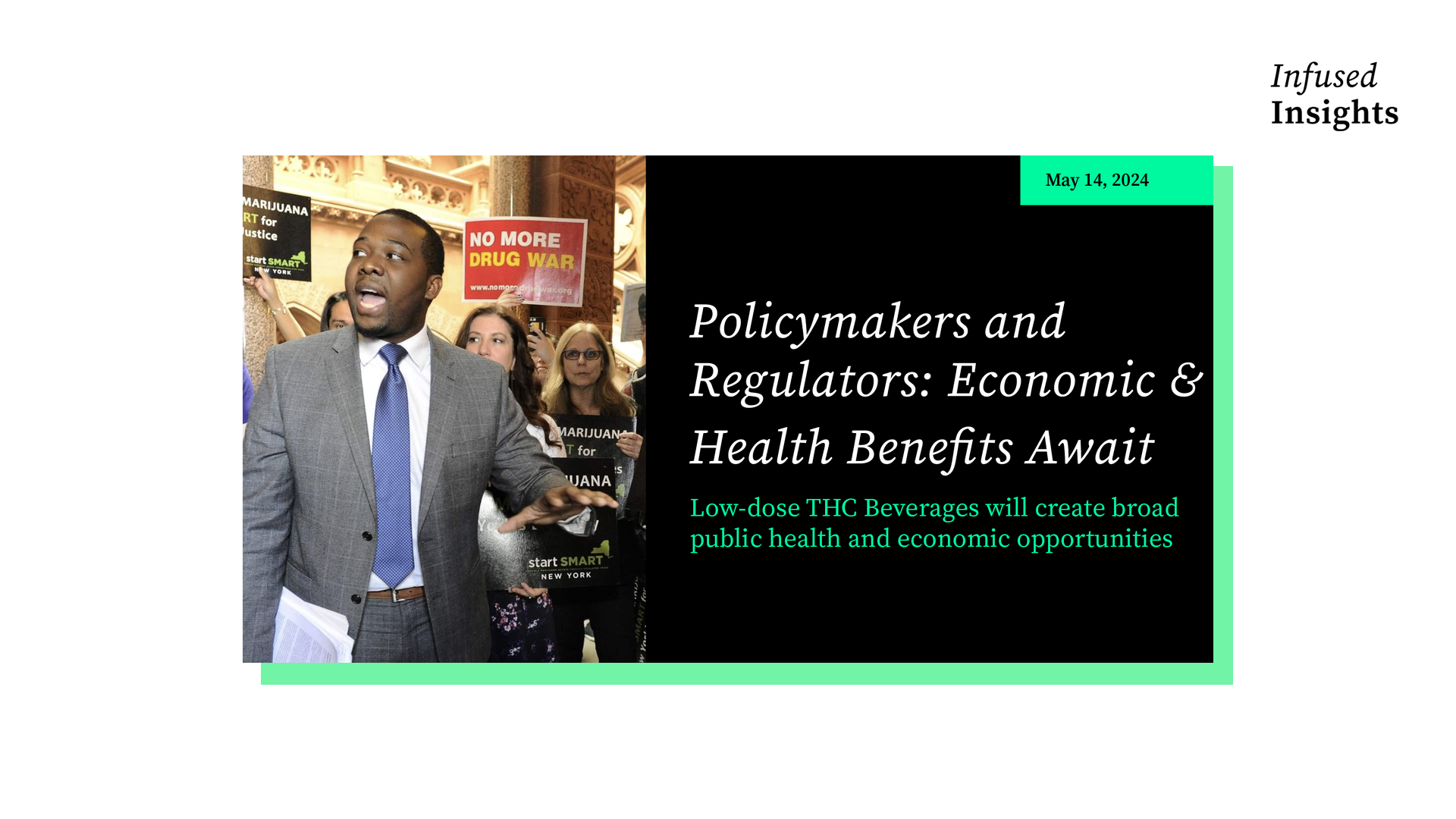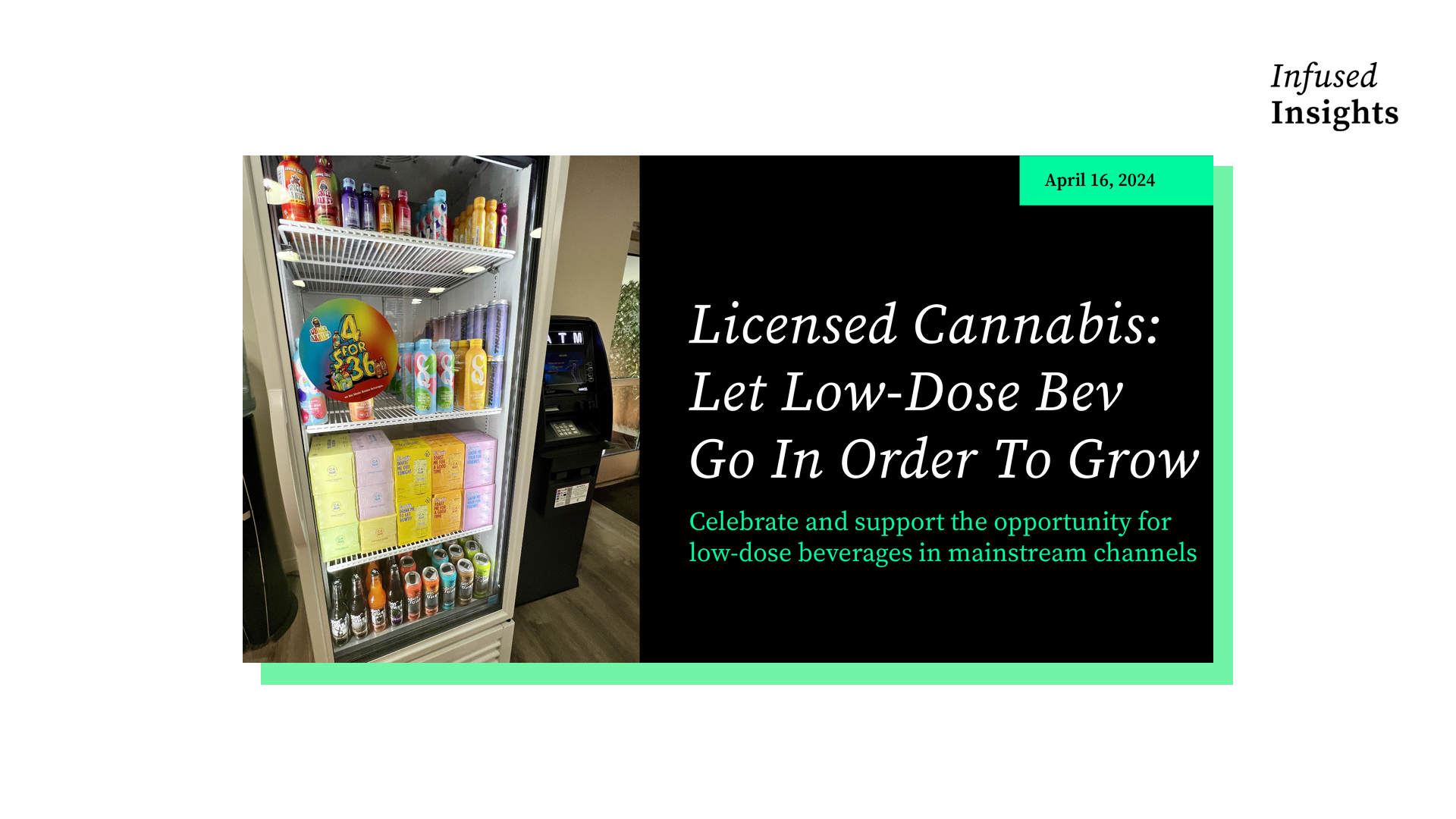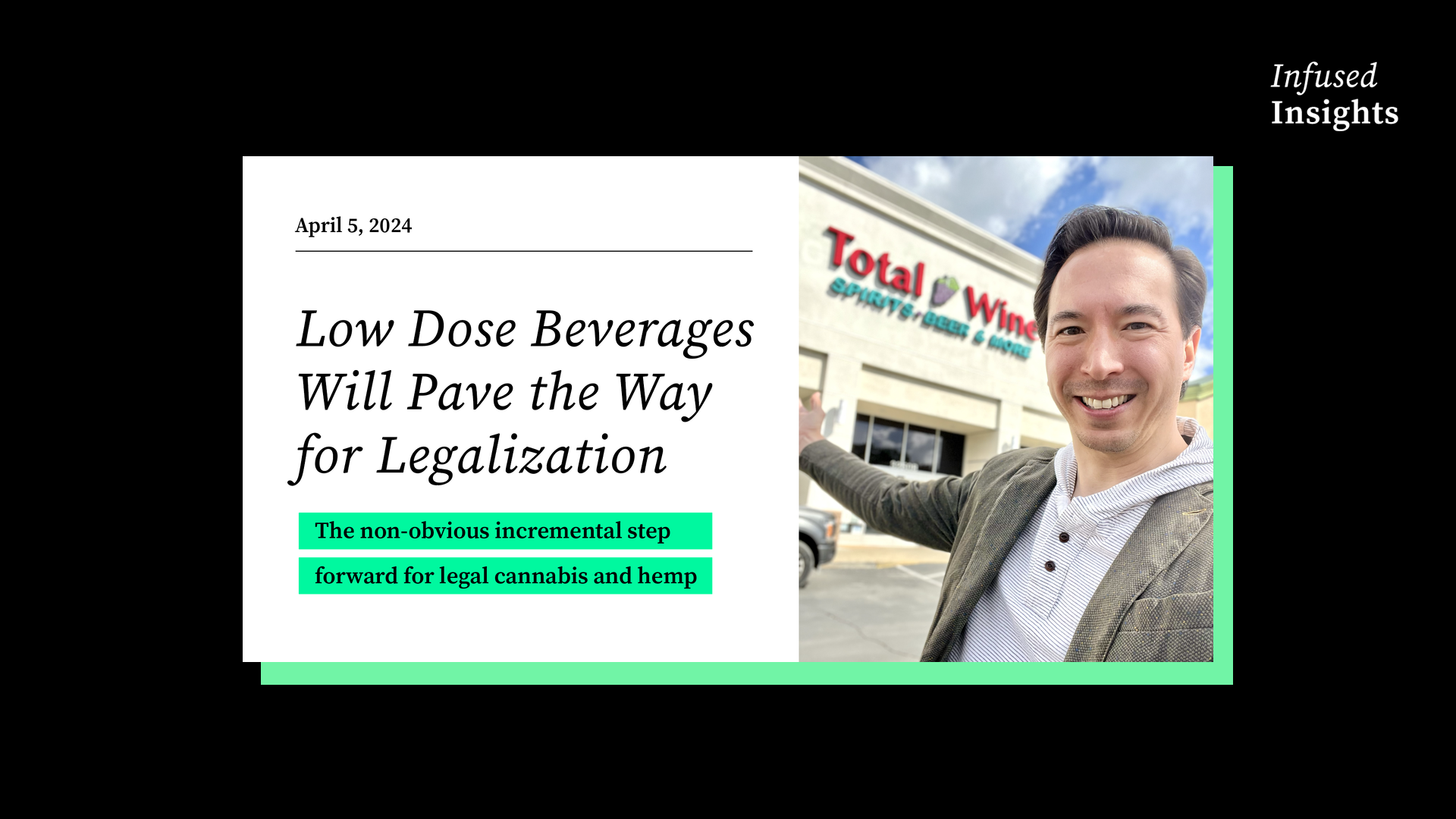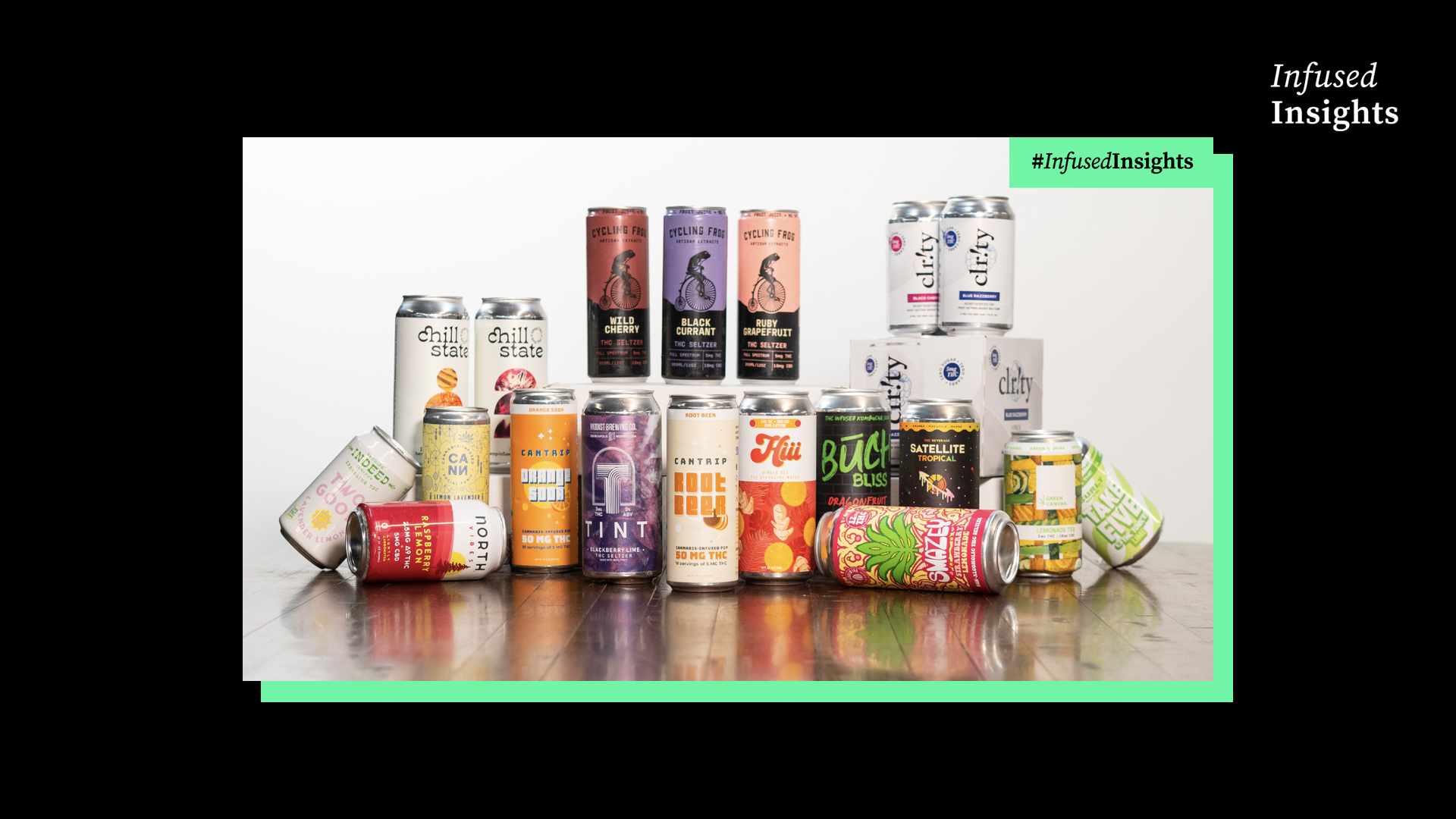Licensed Cannabis Operators: Let Low-Dose Beverages Go In Order to Grow
This post originally appeared on Ben's LinkedIn Newsletter, Infused Insights. You can read and leave comments here. {% video_player "embed_player"...
3 min read
 Ben Larson
:
7/2/24 6:45 PM
Ben Larson
:
7/2/24 6:45 PM

This post originally appeared on Ben's LinkedIn Newsletter, Infused Insights. You can read and leave comments here.
As policymakers and regulators shaping the future of society's access to cannabis, it is crucial to consider the opportunities presented by embracing low-dose THC beverages in the mainstream retail channels. The adult beverage alternatives can generate significant economic benefits through taxation, promote public health by offering safer alternatives to alcohol, and drive increased traffic to regulated dispensaries by making cannabis more approachable. The evolving landscape of adult beverages presents a unique opportunity to harmonize public health objectives, societal trends, and economic incentives.
Research consistently highlights the lower risk profile of cannabis compared to alcohol. To be more specific, according to the Centers for Disease Control and Prevention (CDC), about 178,000 people die from excessive alcohol use in the U.S. each year. Meanwhile, according to the National Institute of Health (NIH), risk of death due to cannabis toxicity is negligible. As I discussed in a previous article on April 16, 2024, access to infused beverages have created a substitute for alcohol where non-alcoholic beverages have been falling flat.

A study published in the Harm Reduction Journal by Amanda Reiman PhD MSW in 2009, in conjunction with data collected by Berkeley Patients Group, an anonymous survey of 350 people showed that forty percent (40%) used cannabis as a substitute for alcohol. Since then, younger generations consumption patterns continued to migrate away from alcohol. Gen Z, known for their health-conscious and informed choices, is consuming approximately 25% less alcohol than previous generations. However, their desire for social, adult experiences remains strong. This shift indicates a substantial market gap for adult-oriented, socially consumable products that do not carry the health and safety burdens associated with traditional alcohol.
This trend is particularly exciting for a variety of on-premise consumption venues, such as concert halls and sporting events. Venue owners often dedicate substantial resources to managing the negative effects of alcohol consumption, including incidents of violence and disorderly conduct. By integrating low-dose THC beverages into their offerings, these venues can potentially reduce such incidents, creating a safer and more enjoyable environment for patrons. The shift from alcohol to cannabis beverages not only promises a decrease in violence but also aligns with a growing demand for healthier, more mindful consumption options.
The nature of low-dose THC beverages inherently promotes moderation, as the effects of even small amounts of THC are felt gradually while consuming the beverage, similar to the experience with alcohol. This immediate feedback mechanism makes it difficult to over-consume, contrasting sharply with other edible forms of cannabis where delayed onset can lead to accidental overconsumption. To ingest a heavy dose of THC through low-dose beverages, one would need to intentionally consume multiple servings, underscoring their inherent safety compared to other cannabis form factors. This built-in moderation mechanism makes low-dose THC beverages a safer and more controlled option for consumers.
Low-dose beverages are failing in the regulated market.
If you speak to any operator in the space, they will say that the beverage category accounts for 1-2% of cannabis sales, and that would have been their answer for the past five years. What these numbers don't disclose is the fact that the most popular products in that cohort are high dose (100 mg when allowed). In fact, in California, if you are to visit Headset's real time tracking of the top selling beverages, 10 out of the top 10 are 100mg beverages. A deeper analysis of Headset's 2023 sales data reveals that low-dose beverages (10 mg or less) accounted for approximately 0.3% of total cannabis sales.

Top 10 selling beverage products across California, Oregon, Washington, and Nevada according to Headset (Past 30 Days from May 3, 2024)
Stated again, in California, the nation's largest and most mature cannabis market, low-dose cannabis beverages accounted for less than a third of one percent of cannabis sales in 2023, generating approximately $2.5 million in tax revenue at a 15% excise tax rate. By contrast, in emerging markets like Minnesota, THC beverages in their early stages have already occasionally surpassed 10% of alcohol sales in retailers like Top Ten Liquors. This comparison highlights the untapped potential and significant growth opportunities for cannabis beverages in more established markets.
For instance, California's annual alcohol sales are approximately $30 billion. Integrating low-dose THC beverages into the adult beverage marketplace could capture a reasonable market share and generate substantial tax revenue, significantly surpassing the current revenue from cannabis beverages. This shift would not only provide financial relief to the cannabis industry but create a discovery mechanism to draw new consumers into the regulated channel. To illustrate this potential, let's conservatively assume a modest 3% marketshare of total alcohol sales with a 5% excise tax:
$30,000,000,000 x 3% x 5% = $45,000,000
The alcohol industry's infrastructure, complete with quality standards and age verification processes, and a proven track record in regulatory compliance and tax collection, is ideally suited to manage the sale and distribution of low-dose THC-infused beverages. Early adopters have demonstrated not just the viability but also the vibrant potential of this market, indicating a clear path forward for broader acceptance and integration.

I urge you to consider ways to incorporate this emerging category within our existing regulatory frameworks. By doing so, we align with the progressive, health-oriented values of consumers and tap into a nascent source of tax revenue that could significantly benefit our communities.
This is an invitation to pioneer a responsible, forward-thinking approach to cannabis regulation—one that recognizes the shifting landscapes of consumer preference and public health. Seize this opportunity to innovate, regulate, and integrate THC-infused beverages as a safe, sociable, and economically beneficial addition to the adult beverage market.
Please feel free to reach-out if you have questions or would like to discuss further.
< Hemp and Cannabis Beverage Trade Groups: Charting a Unified & Effective Path Forward
Mainstream Retailers and Distributors: Navigating the New Terrain of THC-Infused Beverages >

This post originally appeared on Ben's LinkedIn Newsletter, Infused Insights. You can read and leave comments here. {% video_player "embed_player"...

This post originally appeared on Ben's LinkedIn Newsletter, Infused Insights. You can read and leave comments here.

This post originally appeared on Ben's LinkedIn Newsletter, Infused Insights. You can read and leave comments here.